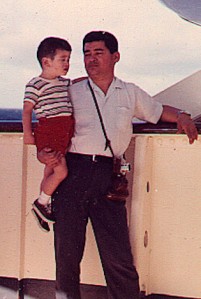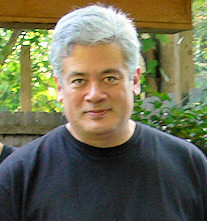Life can be difficult if you have Asperger’s syndrome. In their youth, Aspies are often bullied. They are, after all, “different.” They make people “uncomfortable.” Children notice those things and children can be almost as prejudiced as adults.
When grown, Aspies may have a hard time finding a niche. Many drift from one unsatisfying job to another, with periods of unemployment between—even without a recession.
Despite a brilliant mind and many talents, Ryo Kiyan was one of those. He was fragmented. He couldn’t get himself together. Not until he reached his forties did he decide that what he really wanted to do was make maps. He spent several years studying Geographic Information Systems (GIS), and acquiring a second Bachelor’s degree in geography. He already had one in American history. With those qualifications, he landed the first job he applied for, that of GIS technician with the Sullivan County Division of Planning and Environmental Management.
He was on his way. Life had finally opened up for him and he could join the human race. He made friends. He bought a new car. He had a job he loved. And then, in a relatively short time, it was all gone. Because of his Asperger’s. And a woman who felt “uncomfortable.”
He had thought that he and Miss M were friends. But when he tried to make an innocuous date with her, she froze. She may not have been as attracted to him as he was to her, but he hadn’t tried to come on to her. He only suggested dinner and a movie. At her apartment. He realized later that that was clumsy and inappropriate, but every time he tried to apologize and explain, she refused to talk about it. Wanting badly to mend the rift, he persisted, in his Aspergian way. That persistence frightened her. This was the woman who felt “uncomfortable” when Ryo looked at the books in her apartment.
Other Aspies have had the same problem. As Jesse Saperstein wrote in his autobiographical Atypical: Living with Asperger’s Syndrome in 20⅓ Chapters: “My persistence is so overbearing that girls misconstrue it as stalking.” Ryo never meant to frighten the woman. He had no idea wha happened, until he found out much later that she had taken to carrying a knife and pepper spray. He also learned that her fear made her cry. It astounded him and he told his family to stop criticizing her.
She reported the situation to her superiors, who ordered him to leave her alone. He tried to, in his way, but she was right there. He couldn’t believe he was supposed to ignore her existence. Aspies need their instructions spelled out concretely and in full detail.
In an e-mail, Ryo described what he felt was a major theme in the case, and that was his “idealism.”
As you know, we Aspies are susceptible to idealism. That is why we are frequently cited as being principled, and honest, and supporters of social justice. In our naiveté, we can latch on to visions of the way the world ought to be, which are generally the very same visions held up by society at large as the way the world is supposed to be: a world where everybody gets along, tries to be nice, tries to work for the common good, doesn’t hold grudges, etc.
The NT’s [neurotypicals, or non-Aspies] say they want this world, but then they go ahead with all of their exceptions, and they tell you it shouldn’t bother you that someone you see every day hates your guts, and doesn’t want to talk to you, and thinks bad things about you that aren’t true. You don’t understand this, and the NT’s, in turn, are utterly baffled by your incomprehension. Not being true idealists, and not trying to picture the world in all its wholeness as a system that should be perfected in all its parts, they simply can’t understand why you would want to say “good morning” to someone who despises you. Not understanding that, they interpret your desire to get along with your enemies (I’ve often wondered—was Jesus an Aspie??) as something unnatural and dangerous. The only reason you could want to say hello to a girl who hates you is because you’re “obsessed” with her. Even people who try to be sympathetic with you (your psychotherapists, your lawyer, your sister) believe what amounts to the same thing. You’re “perseverating,” you’re trying to tie up loose ends in an impractical way.
But the simple truth is, you’re just trying to do what they always told you was the right thing, which is to strive for what’s good, and which in this case is to get along with people. And when somebody you see every day feels threatened by you—when you know there’s no reason—and won’t even talk to you, that’s a pretty good indication that there’s something wrong. And wrong things need to be righted. And being a logical Aspie, you might liken it to somebody feeling threatened by people of a different skin color or religions. That would be wrong. It’s wrong to feel threatened by people when you don’t have a good reason, isn’t it?
Because he was half Okinawan, Ryo thought for a time that racial bias might have played a part in what was happening to him. He had yet to learn that the bias against Aspies, who make people “uncomfortable” simply because they are not like the majority, is even stronger.
The county served him with charges of harassment and a hearing was scheduled for late summer. He would be represented by Michael Sussman, a well-known civil rights attorney. Because his behavior toward Miss M was caused in large part by his Asperger’s syndrome, and Asperger’s is regarded as a disability, he felt that his rights as a disabled person were violated. In other words, in the eyes of Sullivan County, he had no right to have been born with Asperger’s.
To make that argument stick, Mr. Sussman urged Ryo to get a formal diagnosis, which he did, from a noted expert on autism. When the letter arrived confirming that diagnosis, he was elated. It explained so much that had gone wrong in his life. Many Aspies have felt the same way. Their problems finally had a name.
Ryo was ready to submit that letter to the designated hearing officer. For reasons never explained, Sussman advised him not to do that. After the hearing, Ryo’s puzzled mother sent an e-mail to Mr. Sussman asking the reason for suppressing that information. She never received an answer.
Waiting for the hearing was stressful. Ryo spent much time on the Internet looking for answers and not finding them. He tried to relax by hiking in nearby mountains and taking pictures.
Ironically, his job was drying up anyway. Due to budget cuts, the GIS section of the Sullivan County Division of Planning was to be abolished and its two members laid off. Ryo could only hope he would be reinstated long enough for an honorable lay-off.
The hearing lasted four days, from the end of August to the beginning of September. The county called several witnesses. Ryo had no witnesses but himself. His mother and sister attended but had to stay quiet. In any case, they weren’t actual witnesses. Once it was over, the final recommendation was up to Lynda Levine, Esq. She said it would take six weeks to reach a decision. It took longer.






